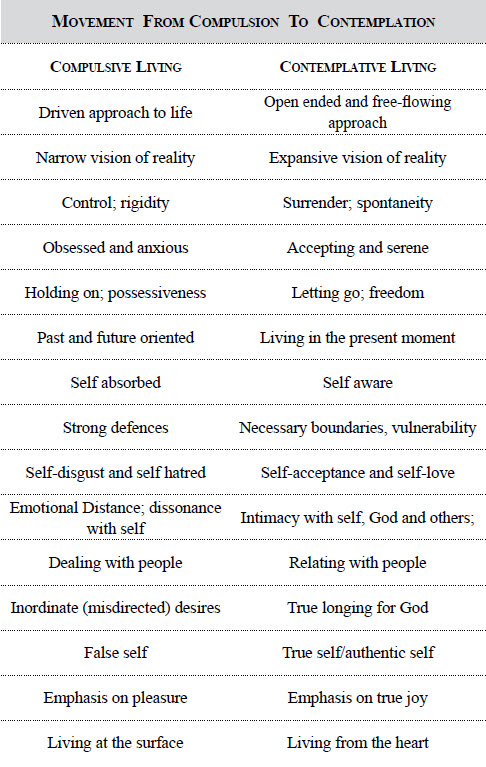Contemplative Living – Whatever?
By Lorie Martin
Guest writer – used with permission
April 1, 2011
Dear Spiritual Journey Friends,
The Sunday School bus that picked me up along our side street every Sunday morning was a part of my spiritual journey as were the little plaques I won for learning memory verses. The horror of seeing Christians wound and abuse one another when only 13 years of age had a dynamic impact as well. Being told Christian girls should wear dresses only, even over pants when tobogganing or bike riding played a part in my formation too. Then there were the prayer meetings that went on far too long, but Something happened there.
What has impacted your spiritual formation and transformation? Find three words to describe your spiritual journey. What are they? And one more question… What are you longing for on your unfolding journey?
The deeper I go into myself the more surprises I find. The closer I move towards the God of our universe the more I shake and shiver, yet cherish. The more I love and do life with others I realize where I am free and where I still am not.
Living on the surface of the daily, living for the exterior of one’s soul, or living to get it all figured out can only last so long. Soon the ‘Best Before’ date of that shows something new, something more, something delicious and delightful is needed and longed for to feed our center; the deep places within where the Kingdom of God and the Lover of our Soul lives within us. ‘Due Date’ seems to appear instead and we realize something divine has been and is being formed in us. Something of God wants to be born in and through us, and we, like Mary, say, “Yes … may it be to me as you have said.” Of course, we, like Mary, do not always know what we are saying yes to, do we? All we have is a hint that it truly is an adventure into the unknown, an ever increasing revelation of divine Love, and the fulfilment of a life dedicated to God in surrender and service.
I am inviting you to spend some time and some sacred space with God. Quiet with God may be a regular part of your day or week, or perhaps you feel a new sense of invitation. Invited, one of the resources Lynda offers on the ‘Soul Flowering’ component of this site, is a book of 80 simple prayer exercises for times of solitude or with community that I have compiled from my own spiritual journey and some that I have gathered from others that have impacted my spiritual formation and my daily life.
Today you will find here a piece from Invited, and a prayer exercise titled ‘Contemplative Living – Whatever?’ I invite you to explore your heart condition and your regular lifestyle – do you live a still, centred life with an ongoing awareness and connecting with God that results in Gospel action, or would you describe it as more of a chaotic, compulsive, driven kind of life – or Whatever? It is my hope that as you enter this article you will pay attention to the movements of your heart. What is your heart telling you? What is it feeling? What is it being invited to?
I trust God fully to meet you in this prayer exercise and transform it into a prayer encounter with The One who loves you most.
Peace,
Lorie
A Contemplative Life
Whatever?
“For with you is the fountain of life; in your light we see light.”
(Psalm 36:9 NIV)
Contemplative Living is the fountain and source out of which all our ministry will flow. Without a contemplative life pattern, it is impossible for us to help others discern the reality of Christ in the whole of their life.
What do we mean by a contemplative way of life? What is its essence? It is not something to do, but a life – a way of life centered on God. It is a life that flows out of a response to God’s love for us. It is God’s life in us. Another way of saying it could be: living the new life we have already been given.
Contemplative Living affects how we view and act in relationship to:
- our body
- our family, friends, co-workers, fellow students, strangers
- our vocation and/or our main occupation
- our role as a citizen
- our role as a consumer
- the created world
I’m not sure it’s a way of life for the faint of heart! It is a life of continuously offering ourselves to be purified of all that is not of God in us.
“The disciplines are activities of the mind and body purposefully undertaken, to bring our personality and total being into effective cooperation with the divine order.” – Dallas Willard
Some of the practices (disciplines) that support the contemplative life:
Prayer silence fasting simplicity consciousness Examen worship music volunteering doing art celebration confession solitude submission study journaling walking advocacy etc.
Spiritual disciplines are part of a contemplative life. Spiritual disciplines demonstrate our availability and openness to the work of the Holy Spirit in shaping our lives, restoring the beauty of the image of God in us. They are the choices we make to nurture and support the Life of God emerging within us and which help us to resist distorting the power of this life and becoming captive to our fallen nature. They are activities that we consistently choose that shape our experience into character habits or regular patterns in our life that repeatedly bring us back to God and open us up to what God is saying to us.
The Latin word for discipline (rule) is “regula” which originally meant “trellis.” If you picture a trellis in a garden, likely you will think of a vine growing over and around it. The spiritual disciplines are the structure that helps us to grow in a direction that is good and stable, rather than on the ground to be trampled upon. The trellis (discipline) is not the Life-giving Source, rather it is simply the means to shape or form us as God leads us.
No discipline, prayer bead, cloth, icon, symbol, or other object, nor any devotional practice, body position, sequence of words, etc. makes God respond any better to any prayer, nor will they make heaven, earth, or hell bend to our bidding. God does not work that way; the world God created does not work that way. Devotional aids are to help us be directed toward God. They are our response to His invitations to be with Him. The moment we believe they have any powers or merit of their own we are being idolatrous or worshipping a form of godliness, rather than God. If you find yourself having that attitude, it is best to stop doing the practice or using the devotional aid. Become aware of any such tendencies you may have and try something else that might cause less of a problem for you. Listen and watch what the Spirit may be inviting you to that brings you life and joy and is easy and light, not another burden.
Some features of a contemplative practice:
- It is my response to the deepening experience of God’s love for me, a way of being that springs from my heart.
- It is created as the Holy Spirit invites and inspires me.
- It will be unique to me, suited to me as a unique creation of God.
- It doesn’t depend on my feelings or mood or what else is happening; it is a discipline not done out of a sense of obligation or rigid legalism, but as a response to God’s drawing yet at the same time, trusting that there is treasure to be found when I stay at it.
- It includes a daily practice. i.e. there is something I will do every day as well as perhaps things I do regularly but not daily, such as participating weekly with others in worship or keeping Sabbath.
- It is do-able in my life; realistic.
- It is a small practice – it’s best to undertake something modest.
- Quiet time/prayer each day.
- It is balanced in 2 ways: Natural to me in keeping with my personality, and at the same time challenges my weaker side.
- It nourishes my mind, body, spirit, relationships and community.
One of the powerful outcomes of a contemplative life is an active and practical response to the world and its needs that are around or in ones life such as justice issues or environmental concerns, serving the poor, or other areas God may lead us into. The results are good fruit that grows out of a healthy, vibrant, and connected tree or vine to its Source. Therefore, we have two components that fit together: Contemplation and Action. We will live out who we are and live out God in, with, and through us.
PRAYER EXERCISE
A Contemplative Life – What-ever?
Set aside some time to listen to God and your own heart. Receive what is for you.
1. A Contemplative Life:
Why is a contemplative life important to you?
What life patterns do you have that show you that you live or value a contemplative life?
Ask Jesus for a picture, scripture, song, or symbol of what contemplative living looks like or means to you.
2. Spiritual Disciplines:
What spiritual disciplines are you presently maintaining? Do you sense a shift or change in this?
Ask:
• What will nurture the presence of God’s life in my soul?
• What will allow it to come forth into my daily & bodily experience?
• What will keep me from being discouraged?
• What do you believe God is inviting you to now?
Working on our own Rule: (Rule – Discipline, habit)
• Go slow and take small steps.
• Realize that it can be adapted.
• Concentrate on the things that have become central in your life.
• Focus first on values.
• Then choose actions and orientations that give substance to the values.
Handling a Rule over time:
• Suspend long-term choices only after clear reflection.
• Suspend (for at least some time) any practice that leads you to shame or that seems (with the
advice of trusted people) to contradict the moving of the Spirit in your experience.
• Ask God to heal you and to find a way to make this practice a liberating and soul-nourishing
practice for you.
3. Contemplation and Action:
Do you sense a healthy balance of contemplation and action in your life?
What actions or fruit are in your life as a result or in response to a contemplative life?
What actions do you feel invited to experience or practice?
What might God be inviting you to let go of? To hold on to? To be open to receive or embrace next?
Some of the above teaching on Contemplative Living was received from SoulStream Ministries: The following chart, Movement from Compulsion to Contemplation, is also from them. Used with Permission.





